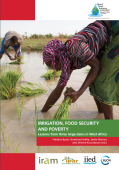
This report presents field evidence from three major public financing schemes for large-scale rice irrigation in West Africa. The report assesses the cost-effectiveness of the schemes, the quality of their management, and the persistence of poverty and food insecurity. It shows that answering questions including, “what type of farmers get the best results?”, “how big should plot sizes be and with what tenure conditions?” and “what credit and marketing systems would support farmers effectively?” are needed if production is to be sustainably improved.
The report aims to help decision makers understand project outcomes and optimize the returns on State investment, both for the taxpayer and for individual farmers. It makes recommendations for action and for the better alignment of public policy objectives with the interests of a diverse set of smallholder farmers, from making better use of existing systems to improving the design of future projects.
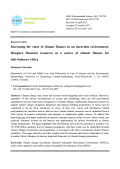
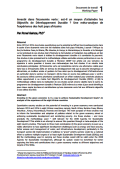
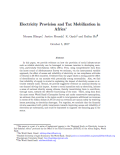
In this paper, the authors provide evidence on how the provision of social infrastructure such as reliable electricity can be leveraged to increase taxation in developing countries, particularly Sub-Saharan Africa (SSA). First, using comprehensive data from the latest round of Afrobarometer Survey the authors estimate, via the instrumental variable approach, the effect of access and reliability of electricity on tax compliance attitudes of citizens in 36 SSA countries. Evidence from the paper shows a strong positive effect of electrification on tax morales with potentially strong externalities. Also, it is found that reliability of supply is crucial in explaining the impact of electricity access on attitudes towards taxes. Second, suggestive evidence on national identity as one channel driving this impact is provided. Access to social amenities such as electricity, induces a sense of national identity among citizens, thereby incentivizing them to contribute, through taxes, towards the effective functioning of the state.
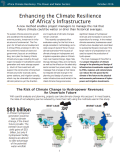
To sustain Africa’s economic growth and accelerate the eradication of extreme poverty, investment in infrastructure is fundamental. The Program for Infrastructure Development in Africa (PIDA), endorsed in 2012 by the continent’s heads of state and government, lays out an ambitious long- term plan for closing Africa’s infrastructure gap, including through major increases in hydroelectric power generation and water storage capacity. Much of this investment will support the construction of long-lived infrastructure (for example, dams, power stations, and irrigation canals), which may be vulnerable to changes in climatic patterns—yet the direction and magnitude of climatic changes remain uncertain. This recently completed effort evaluates—using for the first time a single consistent methodology and a wide range of state-of-the-art future climate scenarios—the impacts of climate change on hydropower and irrigation expansion plans in Africa’s main river basins (Congo, Niger, Nile, Orange, Senegal, Volta, and Zambezi), as well as the effects on the electricity sector across four power pools.
